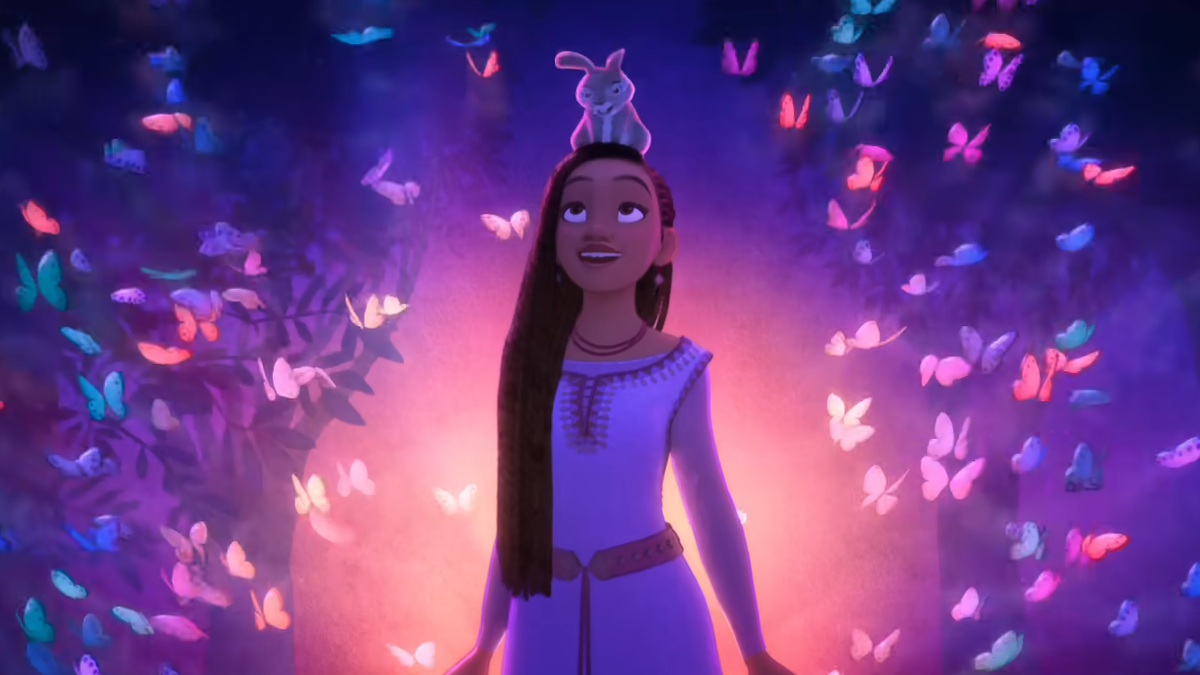
Walt Disney Studios composed two tributes this year to commemorate a hundred years of productions. The first we glimpsed was Once Upon a Studio, a short and sweet crossover of Disney’s past animated characters acknowledging Walt’s legacy. The second is Wish, a film that looks original on the surface but embodies all the tropes and references of past Disney animated films. In the film’s attempt to hammer home all the stuff audiences love about Disney films, it waters them down into a mushy hotdish of nostalgia, coming off less like a Disney animated film and more like what other studio executives think a Disney film is.
The premise is a shaky one that offers little surprise. The Kingdom of Rosas, set in the Mediterranean, has prided itself on being a haven for protection under the magic of the ruling King Magnifico (Chris Pine). He offers a utopian existence free of worry and monetary concerns. All he asks is that people submit their personal wishes to the king, which can not only be harnessed as magical orbs but also be wiped from your memory. Don’t worry; the king will grant these wishes later, much like a random lottery.
Asha (Ariana DeBose), a teenager working in the king’s palace, has only known this life and questions none of it. Only once she interviews to become the king’s apprentice, she learns the easy-to-decipher truth: the king is a greedy man who hordes wishes for himself, including Asha’s 100-year-old grandfather, which should’ve been a major tip-off. Disillusioned about her kingdom, Asha seeks the help of a magical star with all sorts of magical powers. Chief among those powers is the ability to make animals talk, leading to Asha’s pet goat, Valentino, being voiced by a deep and eccentric Alan Tudyk. Together, they might be able to stop King Magnifico’s ego and dark magic.
Like past Walt Disney Studio animated films, Wish is a musical with many songs from Dave Metzger and Julia Michaels. Some highlights include a peppy number on individuality with “I’m a Star” and Chris Pine chewing up the scenery with “This Is the Thanks I Get.” While these songs are pleasing to the ears, it’s debatable whether they’ll evolve into earworms. Considering the worn ground these songs treat and the immediate comparisons they will garner, I’m doubtful this will be another case of Frozen dominating the charts.
Despite its attempt to bleed that line between CGI and traditional 2D, the animation looks shockingly generic. Certainly, a storybook quality was intended, but it turns into the typical template of Disney’s big-eyed characters and low-key exaggerations somewhere along the rendering process. It doesn’t help that so much of the film tries to force references to other Disney properties but in a less tactful disguise. It becomes obvious quickly that Asha’s co-workers are intended to be three dwarves of Snow White. Don’t worry if you don’t catch all the references immediately; the film blatantly makes it clear in the final few minutes.
If the past few Disney CGI films had bits and pieces of past-movie references, Wish plays like an overstuffed mess. Everything from Peter Pan to Zootopia gets a blatant nod, less like a background Easter egg and more like a foreground commercial. All of this would be fine if the film itself were charming and engaging, but it skirts so quickly between all its tropes that it rarely has a chance to develop a personality all its own. Asha and Magnifico come off more like cookie-cutter characters with few moments between their musical numbers and talk of wishes to become fully realized. This becomes especially frustrating by the third act, where it seems like the king is reduced to spouting Disney villain punchlines, wielding a powerful staff with his green-themed magic.
As much as I’d love to champion an animated film about ambitions and passions, Wish puts in minimal effort as a Disney animated film that is more derivative than distinct. It has a handful of decent moments involving Alan Tudyk hamming it up and Chris Pine doing his best to play up an egotistical villain. As a whole, though, it feels like a lesser ode than Once Upon a Studio, reminding its audiences of far better films, going so far as to advertise them in the ending credits. Some might be fine with this film playing less like an original narrative and more like a tribute, but Disney’s legacy deserves better than a 95-minute slurry of all their animated films being mashed together.

 “My Spy: The Eternal City” Review
“My Spy: The Eternal City” Review  “Deadpool & Wolverine” Review
“Deadpool & Wolverine” Review  “The Boys: Season Four” Review
“The Boys: Season Four” Review  “The American Society of Magical Negroes” Review
“The American Society of Magical Negroes” Review  “Twisters” Review
“Twisters” Review  “Sausage Party: Foodtopia” Review
“Sausage Party: Foodtopia” Review  “Robot Dreams” Review
“Robot Dreams” Review  “Godzilla x Kong: The New Empire” Review
“Godzilla x Kong: The New Empire” Review 



